Contract Law: Analysis of Masters v. Cameron and Baulkham Hills Cases
VerifiedAdded on 2022/10/04
|8
|1649
|18
Report
AI Summary
This report delves into the complexities of contract law, focusing on the pivotal cases of Masters v. Cameron (1954) and Baulkham Hills Private Hospital Pty Ltd v GR Securities Pty Ltd (1986). It examines the essential elements required for a contract to be legally enforceable, including offer, acceptance, consideration, and the intention to create legal relations. The analysis explores the significance of formal documentation versus informal agreements, and the court's interpretation of parties' intentions. The report highlights the different categories of agreements and their implications, particularly focusing on the conditions under which a signed document constitutes a binding contract. The report also analyzes the fourth category of contracts, recognized in the Baulkham Hills case, where parties intend to be legally bound but plan to formalize the agreement later. The report emphasizes the significance of discerning the parties' motives and the language used in the agreement to determine its legal enforceability. This detailed exploration offers a comprehensive understanding of contract law principles.
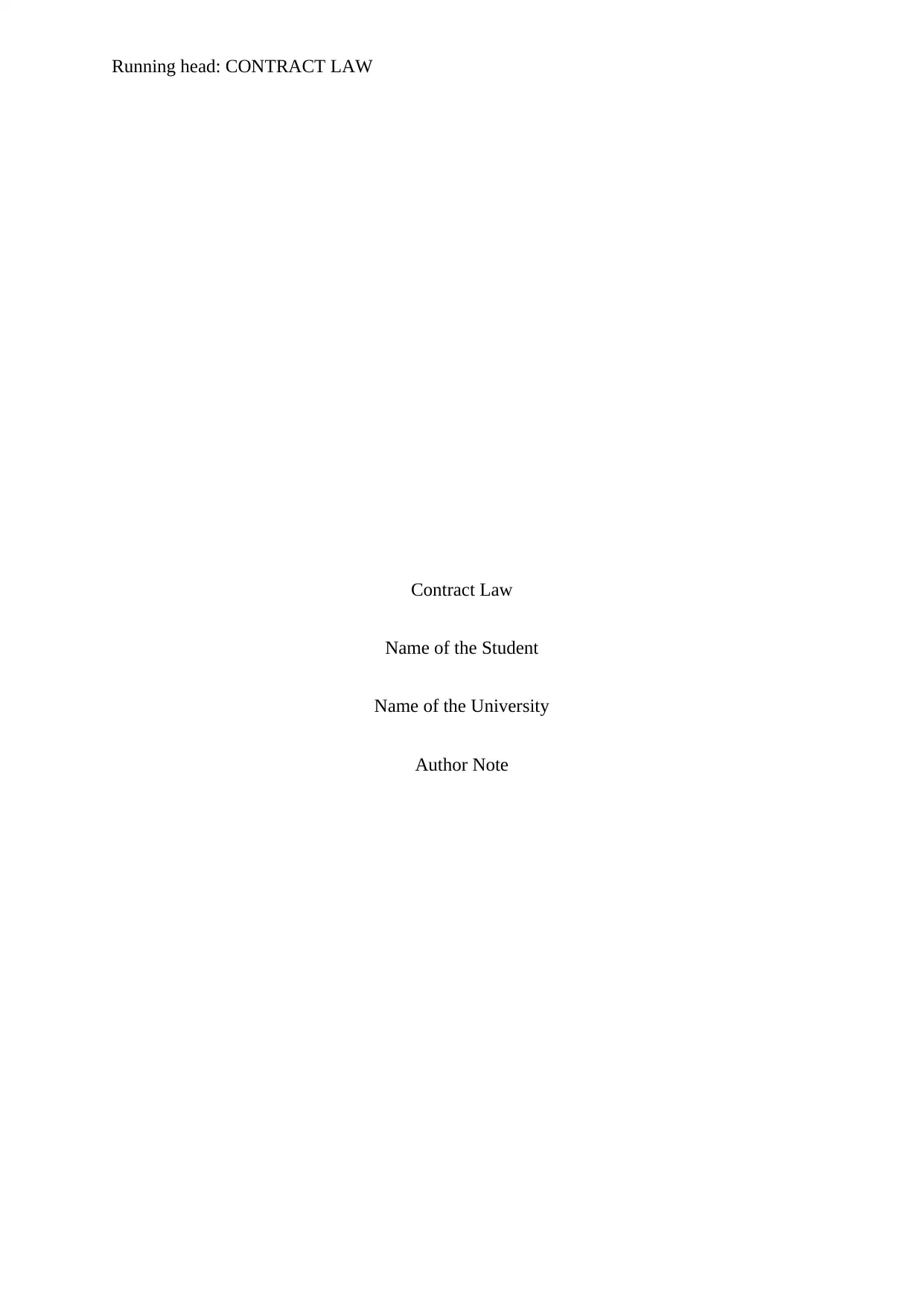
Running head: CONTRACT LAW
Contract Law
Name of the Student
Name of the University
Author Note
Contract Law
Name of the Student
Name of the University
Author Note
Paraphrase This Document
Need a fresh take? Get an instant paraphrase of this document with our AI Paraphraser
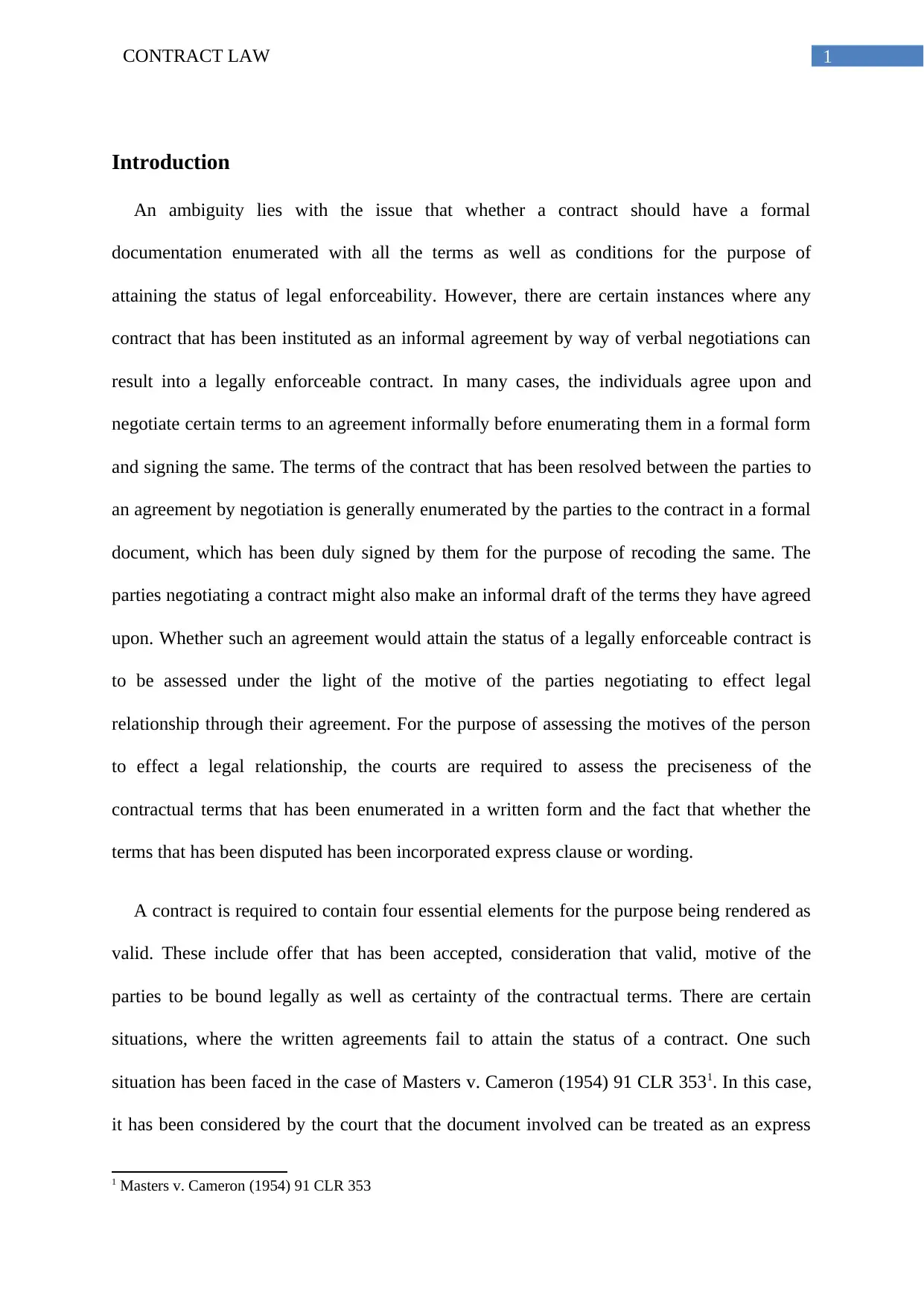
1CONTRACT LAW
Introduction
An ambiguity lies with the issue that whether a contract should have a formal
documentation enumerated with all the terms as well as conditions for the purpose of
attaining the status of legal enforceability. However, there are certain instances where any
contract that has been instituted as an informal agreement by way of verbal negotiations can
result into a legally enforceable contract. In many cases, the individuals agree upon and
negotiate certain terms to an agreement informally before enumerating them in a formal form
and signing the same. The terms of the contract that has been resolved between the parties to
an agreement by negotiation is generally enumerated by the parties to the contract in a formal
document, which has been duly signed by them for the purpose of recoding the same. The
parties negotiating a contract might also make an informal draft of the terms they have agreed
upon. Whether such an agreement would attain the status of a legally enforceable contract is
to be assessed under the light of the motive of the parties negotiating to effect legal
relationship through their agreement. For the purpose of assessing the motives of the person
to effect a legal relationship, the courts are required to assess the preciseness of the
contractual terms that has been enumerated in a written form and the fact that whether the
terms that has been disputed has been incorporated express clause or wording.
A contract is required to contain four essential elements for the purpose being rendered as
valid. These include offer that has been accepted, consideration that valid, motive of the
parties to be bound legally as well as certainty of the contractual terms. There are certain
situations, where the written agreements fail to attain the status of a contract. One such
situation has been faced in the case of Masters v. Cameron (1954) 91 CLR 3531. In this case,
it has been considered by the court that the document involved can be treated as an express
1 Masters v. Cameron (1954) 91 CLR 353
Introduction
An ambiguity lies with the issue that whether a contract should have a formal
documentation enumerated with all the terms as well as conditions for the purpose of
attaining the status of legal enforceability. However, there are certain instances where any
contract that has been instituted as an informal agreement by way of verbal negotiations can
result into a legally enforceable contract. In many cases, the individuals agree upon and
negotiate certain terms to an agreement informally before enumerating them in a formal form
and signing the same. The terms of the contract that has been resolved between the parties to
an agreement by negotiation is generally enumerated by the parties to the contract in a formal
document, which has been duly signed by them for the purpose of recoding the same. The
parties negotiating a contract might also make an informal draft of the terms they have agreed
upon. Whether such an agreement would attain the status of a legally enforceable contract is
to be assessed under the light of the motive of the parties negotiating to effect legal
relationship through their agreement. For the purpose of assessing the motives of the person
to effect a legal relationship, the courts are required to assess the preciseness of the
contractual terms that has been enumerated in a written form and the fact that whether the
terms that has been disputed has been incorporated express clause or wording.
A contract is required to contain four essential elements for the purpose being rendered as
valid. These include offer that has been accepted, consideration that valid, motive of the
parties to be bound legally as well as certainty of the contractual terms. There are certain
situations, where the written agreements fail to attain the status of a contract. One such
situation has been faced in the case of Masters v. Cameron (1954) 91 CLR 3531. In this case,
it has been considered by the court that the document involved can be treated as an express
1 Masters v. Cameron (1954) 91 CLR 353
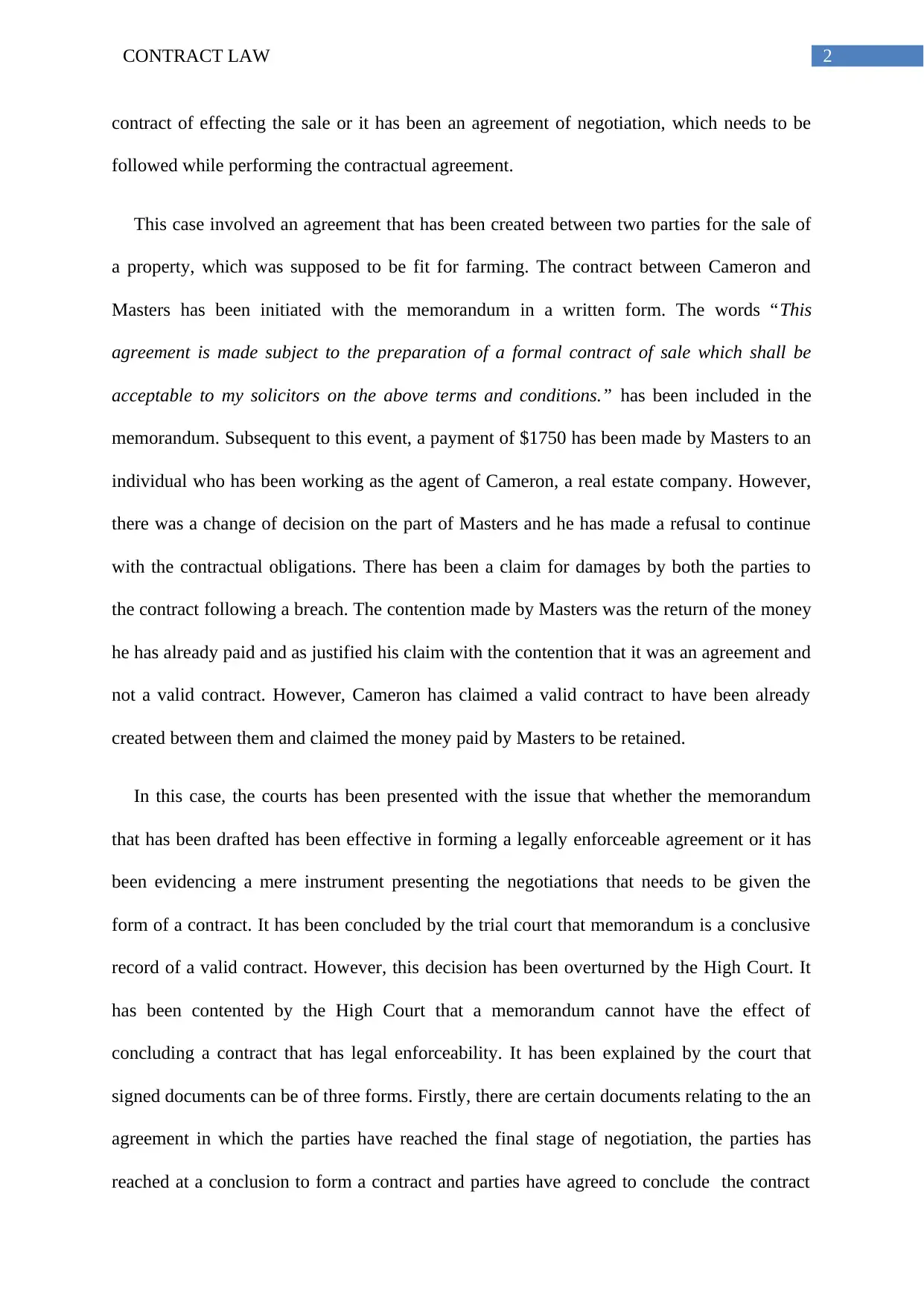
2CONTRACT LAW
contract of effecting the sale or it has been an agreement of negotiation, which needs to be
followed while performing the contractual agreement.
This case involved an agreement that has been created between two parties for the sale of
a property, which was supposed to be fit for farming. The contract between Cameron and
Masters has been initiated with the memorandum in a written form. The words “This
agreement is made subject to the preparation of a formal contract of sale which shall be
acceptable to my solicitors on the above terms and conditions.” has been included in the
memorandum. Subsequent to this event, a payment of $1750 has been made by Masters to an
individual who has been working as the agent of Cameron, a real estate company. However,
there was a change of decision on the part of Masters and he has made a refusal to continue
with the contractual obligations. There has been a claim for damages by both the parties to
the contract following a breach. The contention made by Masters was the return of the money
he has already paid and as justified his claim with the contention that it was an agreement and
not a valid contract. However, Cameron has claimed a valid contract to have been already
created between them and claimed the money paid by Masters to be retained.
In this case, the courts has been presented with the issue that whether the memorandum
that has been drafted has been effective in forming a legally enforceable agreement or it has
been evidencing a mere instrument presenting the negotiations that needs to be given the
form of a contract. It has been concluded by the trial court that memorandum is a conclusive
record of a valid contract. However, this decision has been overturned by the High Court. It
has been contented by the High Court that a memorandum cannot have the effect of
concluding a contract that has legal enforceability. It has been explained by the court that
signed documents can be of three forms. Firstly, there are certain documents relating to the an
agreement in which the parties have reached the final stage of negotiation, the parties has
reached at a conclusion to form a contract and parties have agreed to conclude the contract
contract of effecting the sale or it has been an agreement of negotiation, which needs to be
followed while performing the contractual agreement.
This case involved an agreement that has been created between two parties for the sale of
a property, which was supposed to be fit for farming. The contract between Cameron and
Masters has been initiated with the memorandum in a written form. The words “This
agreement is made subject to the preparation of a formal contract of sale which shall be
acceptable to my solicitors on the above terms and conditions.” has been included in the
memorandum. Subsequent to this event, a payment of $1750 has been made by Masters to an
individual who has been working as the agent of Cameron, a real estate company. However,
there was a change of decision on the part of Masters and he has made a refusal to continue
with the contractual obligations. There has been a claim for damages by both the parties to
the contract following a breach. The contention made by Masters was the return of the money
he has already paid and as justified his claim with the contention that it was an agreement and
not a valid contract. However, Cameron has claimed a valid contract to have been already
created between them and claimed the money paid by Masters to be retained.
In this case, the courts has been presented with the issue that whether the memorandum
that has been drafted has been effective in forming a legally enforceable agreement or it has
been evidencing a mere instrument presenting the negotiations that needs to be given the
form of a contract. It has been concluded by the trial court that memorandum is a conclusive
record of a valid contract. However, this decision has been overturned by the High Court. It
has been contented by the High Court that a memorandum cannot have the effect of
concluding a contract that has legal enforceability. It has been explained by the court that
signed documents can be of three forms. Firstly, there are certain documents relating to the an
agreement in which the parties have reached the final stage of negotiation, the parties has
reached at a conclusion to form a contract and parties have agreed to conclude the contract
⊘ This is a preview!⊘
Do you want full access?
Subscribe today to unlock all pages.

Trusted by 1+ million students worldwide
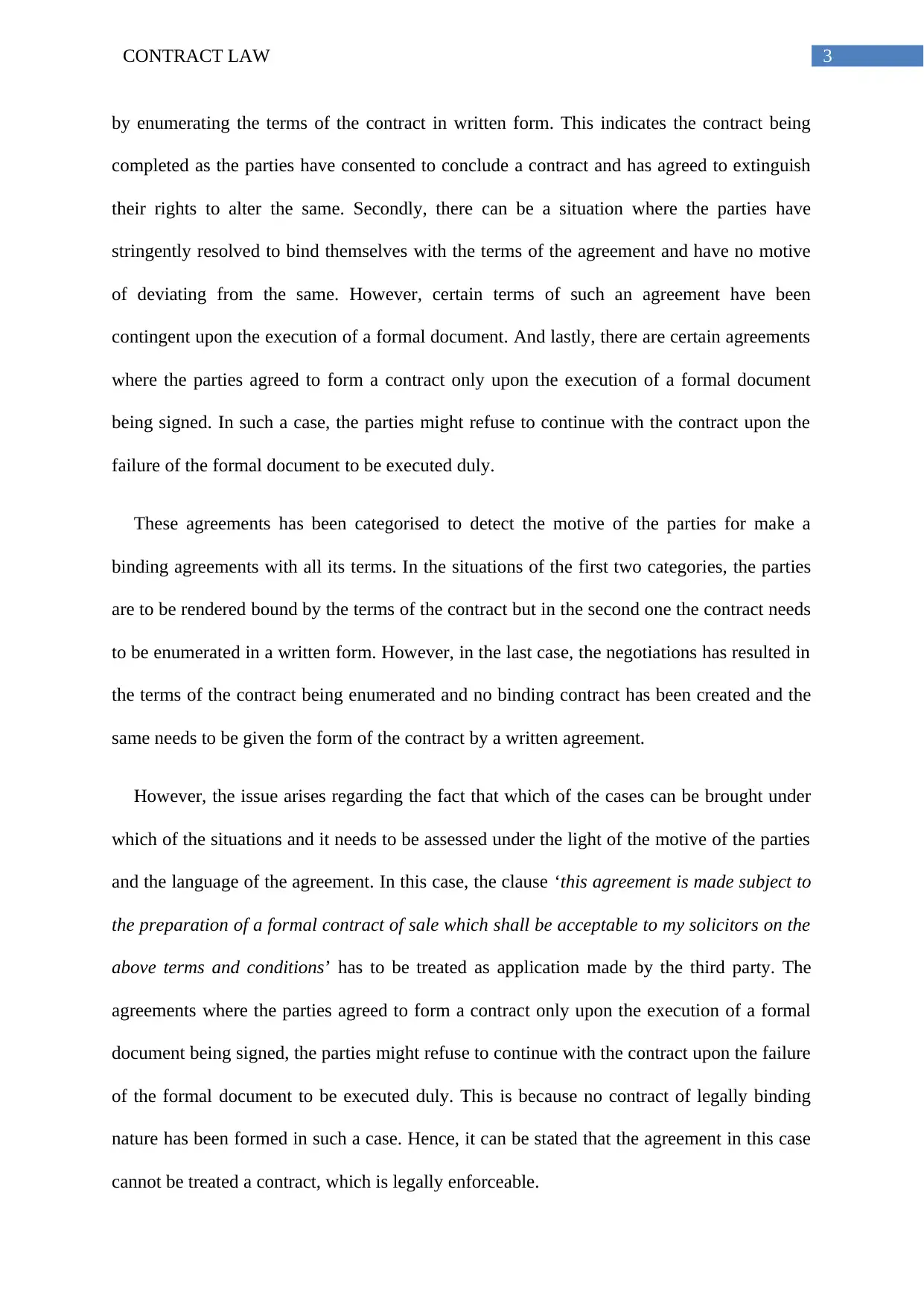
3CONTRACT LAW
by enumerating the terms of the contract in written form. This indicates the contract being
completed as the parties have consented to conclude a contract and has agreed to extinguish
their rights to alter the same. Secondly, there can be a situation where the parties have
stringently resolved to bind themselves with the terms of the agreement and have no motive
of deviating from the same. However, certain terms of such an agreement have been
contingent upon the execution of a formal document. And lastly, there are certain agreements
where the parties agreed to form a contract only upon the execution of a formal document
being signed. In such a case, the parties might refuse to continue with the contract upon the
failure of the formal document to be executed duly.
These agreements has been categorised to detect the motive of the parties for make a
binding agreements with all its terms. In the situations of the first two categories, the parties
are to be rendered bound by the terms of the contract but in the second one the contract needs
to be enumerated in a written form. However, in the last case, the negotiations has resulted in
the terms of the contract being enumerated and no binding contract has been created and the
same needs to be given the form of the contract by a written agreement.
However, the issue arises regarding the fact that which of the cases can be brought under
which of the situations and it needs to be assessed under the light of the motive of the parties
and the language of the agreement. In this case, the clause ‘this agreement is made subject to
the preparation of a formal contract of sale which shall be acceptable to my solicitors on the
above terms and conditions’ has to be treated as application made by the third party. The
agreements where the parties agreed to form a contract only upon the execution of a formal
document being signed, the parties might refuse to continue with the contract upon the failure
of the formal document to be executed duly. This is because no contract of legally binding
nature has been formed in such a case. Hence, it can be stated that the agreement in this case
cannot be treated a contract, which is legally enforceable.
by enumerating the terms of the contract in written form. This indicates the contract being
completed as the parties have consented to conclude a contract and has agreed to extinguish
their rights to alter the same. Secondly, there can be a situation where the parties have
stringently resolved to bind themselves with the terms of the agreement and have no motive
of deviating from the same. However, certain terms of such an agreement have been
contingent upon the execution of a formal document. And lastly, there are certain agreements
where the parties agreed to form a contract only upon the execution of a formal document
being signed. In such a case, the parties might refuse to continue with the contract upon the
failure of the formal document to be executed duly.
These agreements has been categorised to detect the motive of the parties for make a
binding agreements with all its terms. In the situations of the first two categories, the parties
are to be rendered bound by the terms of the contract but in the second one the contract needs
to be enumerated in a written form. However, in the last case, the negotiations has resulted in
the terms of the contract being enumerated and no binding contract has been created and the
same needs to be given the form of the contract by a written agreement.
However, the issue arises regarding the fact that which of the cases can be brought under
which of the situations and it needs to be assessed under the light of the motive of the parties
and the language of the agreement. In this case, the clause ‘this agreement is made subject to
the preparation of a formal contract of sale which shall be acceptable to my solicitors on the
above terms and conditions’ has to be treated as application made by the third party. The
agreements where the parties agreed to form a contract only upon the execution of a formal
document being signed, the parties might refuse to continue with the contract upon the failure
of the formal document to be executed duly. This is because no contract of legally binding
nature has been formed in such a case. Hence, it can be stated that the agreement in this case
cannot be treated a contract, which is legally enforceable.
Paraphrase This Document
Need a fresh take? Get an instant paraphrase of this document with our AI Paraphraser
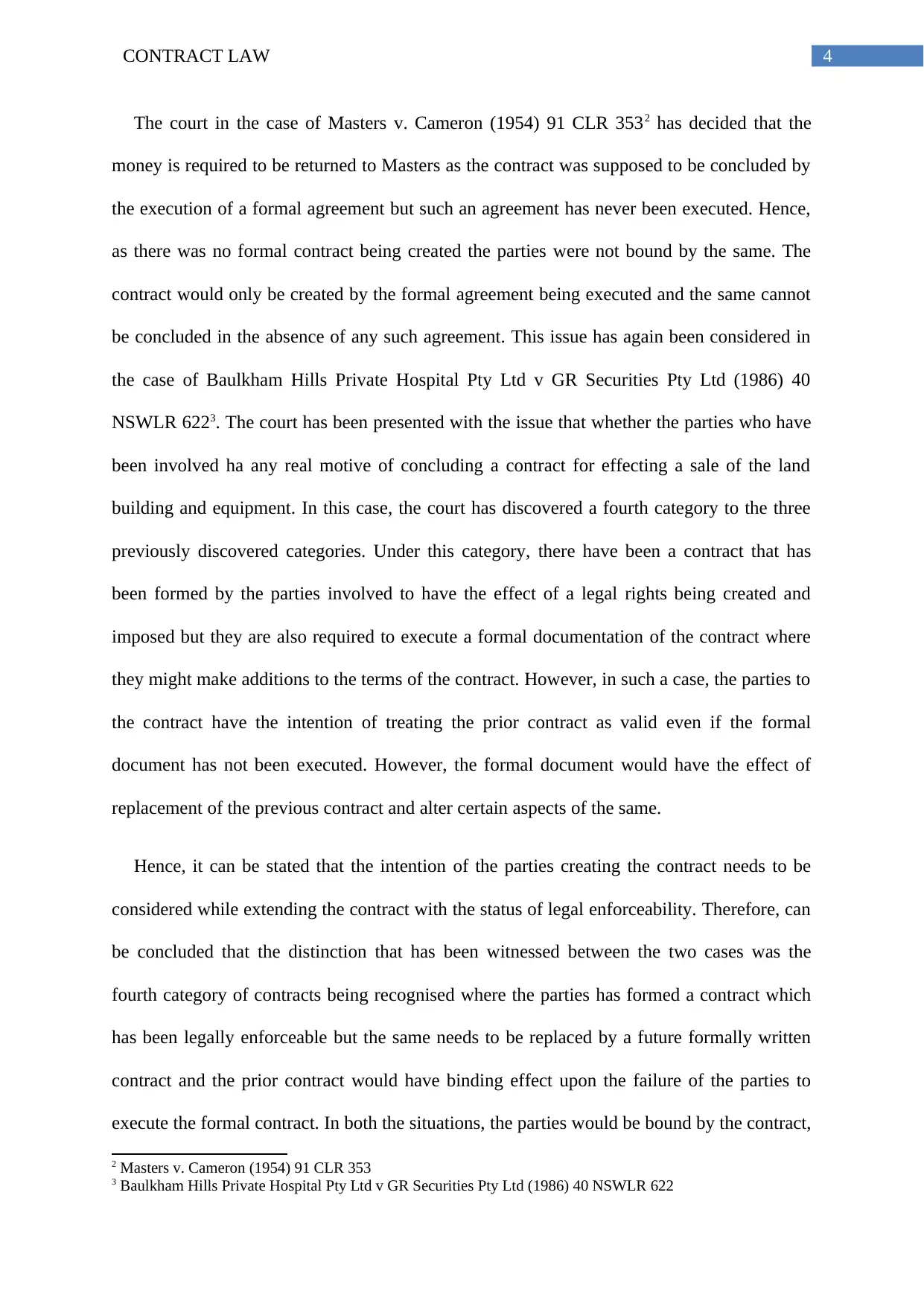
4CONTRACT LAW
The court in the case of Masters v. Cameron (1954) 91 CLR 3532 has decided that the
money is required to be returned to Masters as the contract was supposed to be concluded by
the execution of a formal agreement but such an agreement has never been executed. Hence,
as there was no formal contract being created the parties were not bound by the same. The
contract would only be created by the formal agreement being executed and the same cannot
be concluded in the absence of any such agreement. This issue has again been considered in
the case of Baulkham Hills Private Hospital Pty Ltd v GR Securities Pty Ltd (1986) 40
NSWLR 6223. The court has been presented with the issue that whether the parties who have
been involved ha any real motive of concluding a contract for effecting a sale of the land
building and equipment. In this case, the court has discovered a fourth category to the three
previously discovered categories. Under this category, there have been a contract that has
been formed by the parties involved to have the effect of a legal rights being created and
imposed but they are also required to execute a formal documentation of the contract where
they might make additions to the terms of the contract. However, in such a case, the parties to
the contract have the intention of treating the prior contract as valid even if the formal
document has not been executed. However, the formal document would have the effect of
replacement of the previous contract and alter certain aspects of the same.
Hence, it can be stated that the intention of the parties creating the contract needs to be
considered while extending the contract with the status of legal enforceability. Therefore, can
be concluded that the distinction that has been witnessed between the two cases was the
fourth category of contracts being recognised where the parties has formed a contract which
has been legally enforceable but the same needs to be replaced by a future formally written
contract and the prior contract would have binding effect upon the failure of the parties to
execute the formal contract. In both the situations, the parties would be bound by the contract,
2 Masters v. Cameron (1954) 91 CLR 353
3 Baulkham Hills Private Hospital Pty Ltd v GR Securities Pty Ltd (1986) 40 NSWLR 622
The court in the case of Masters v. Cameron (1954) 91 CLR 3532 has decided that the
money is required to be returned to Masters as the contract was supposed to be concluded by
the execution of a formal agreement but such an agreement has never been executed. Hence,
as there was no formal contract being created the parties were not bound by the same. The
contract would only be created by the formal agreement being executed and the same cannot
be concluded in the absence of any such agreement. This issue has again been considered in
the case of Baulkham Hills Private Hospital Pty Ltd v GR Securities Pty Ltd (1986) 40
NSWLR 6223. The court has been presented with the issue that whether the parties who have
been involved ha any real motive of concluding a contract for effecting a sale of the land
building and equipment. In this case, the court has discovered a fourth category to the three
previously discovered categories. Under this category, there have been a contract that has
been formed by the parties involved to have the effect of a legal rights being created and
imposed but they are also required to execute a formal documentation of the contract where
they might make additions to the terms of the contract. However, in such a case, the parties to
the contract have the intention of treating the prior contract as valid even if the formal
document has not been executed. However, the formal document would have the effect of
replacement of the previous contract and alter certain aspects of the same.
Hence, it can be stated that the intention of the parties creating the contract needs to be
considered while extending the contract with the status of legal enforceability. Therefore, can
be concluded that the distinction that has been witnessed between the two cases was the
fourth category of contracts being recognised where the parties has formed a contract which
has been legally enforceable but the same needs to be replaced by a future formally written
contract and the prior contract would have binding effect upon the failure of the parties to
execute the formal contract. In both the situations, the parties would be bound by the contract,
2 Masters v. Cameron (1954) 91 CLR 353
3 Baulkham Hills Private Hospital Pty Ltd v GR Securities Pty Ltd (1986) 40 NSWLR 622

5CONTRACT LAW
and the latter formal contract would replace the previous one or make certain amendments to
the same.
and the latter formal contract would replace the previous one or make certain amendments to
the same.
⊘ This is a preview!⊘
Do you want full access?
Subscribe today to unlock all pages.

Trusted by 1+ million students worldwide

6CONTRACT LAW
Bibliography
Baulkham Hills Private Hospital Pty Ltd v GR Securities Pty Ltd (1986) 40 NSWLR 622
Masters v. Cameron (1954) 91 CLR 353
Bibliography
Baulkham Hills Private Hospital Pty Ltd v GR Securities Pty Ltd (1986) 40 NSWLR 622
Masters v. Cameron (1954) 91 CLR 353
Paraphrase This Document
Need a fresh take? Get an instant paraphrase of this document with our AI Paraphraser

7CONTRACT LAW
1 out of 8
Related Documents
Your All-in-One AI-Powered Toolkit for Academic Success.
+13062052269
info@desklib.com
Available 24*7 on WhatsApp / Email
![[object Object]](/_next/static/media/star-bottom.7253800d.svg)
Unlock your academic potential
Copyright © 2020–2026 A2Z Services. All Rights Reserved. Developed and managed by ZUCOL.





